think 的用法及注意事项.doc
think,think_of,think_about,think_over的区别和用法

think,think of,think about,think over的区别和用法think单独使用时表示“思考”,接that宾语从句时意为“认为、觉得”。
如:He is thinking how to work out the problem.他在思考如何解这道题。
I think I'll take it.我想我会买。
当think后面的宾语从句含有否定意义时,通常形式上否定think,但意义上却是否定宾语从句。
如:I don't think it will rain.我认为不会下雨。
think of意为“考虑到、想到”,后常接代词、名词或动词-ing形式;意为“认为”时,一般用于疑问句中,与what连用。
如:It's good to think of the future.考虑到未来是对的。
He thought of a good plan.他想到一项好计划。
What do you think of the play?(=How do you find /like /enjoy the play?)你觉得这部戏剧怎么样?think about可接名词、动词-ing形式或由疑问词引导的不定式或宾语从句,表示“考虑……”。
如:He's thinking about a problem.He has thought about it for a long time.他正在考虑一个问题,他已经考虑了很长时间了。
Please think about how to tell her the bad news.请考虑一下,如何把这个不幸的消息告诉她。
He carefully thought about what I said.他仔细考虑了一下我所说的话。
think over意为“仔细考虑”,后接名词或代词作宾语。
当后接代词时,应把代词放在over之前。
如:Let me think it over.让我好好想一想。
think的用法和搭配
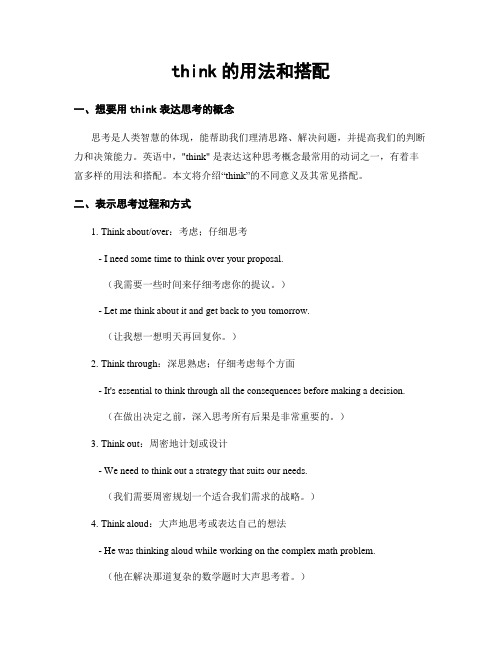
think的用法和搭配一、想要用think表达思考的概念思考是人类智慧的体现,能帮助我们理清思路、解决问题,并提高我们的判断力和决策能力。
英语中,"think" 是表达这种思考概念最常用的动词之一,有着丰富多样的用法和搭配。
本文将介绍“think”的不同意义及其常见搭配。
二、表示思考过程和方式1. Think about/over:考虑;仔细思考- I need some time to think over your proposal.(我需要一些时间来仔细考虑你的提议。
)- Let me think about it and get back to you tomorrow.(让我想一想明天再回复你。
)2. Think through:深思熟虑;仔细考虑每个方面- It's essential to think through all the consequences before making a decision.(在做出决定之前,深入思考所有后果是非常重要的。
)3. Think out:周密地计划或设计- We need to think out a strategy that suits our needs.(我们需要周密规划一个适合我们需求的战略。
)4. Think aloud:大声地思考或表达自己的想法- He was thinking aloud while working on the complex math problem.(他在解决那道复杂的数学题时大声思考着。
)三、表示某种思维活动1. Think of:想起;想到- I can't think of his name right now, but I'll remember it later.(我现在想不起他的名字,但我会记得的。
)- What do you think of this idea? Do you think it will work?(你对这个想法有什么看法?你认为它会奏效吗?)2. Think highly/well/badly of:对...评价很高/很好/很差- My boss thinks highly of my work, and that's why I got promoted.(我的老板对我的工作评价很高,所以我得到了晋升。
think否定前移的用法
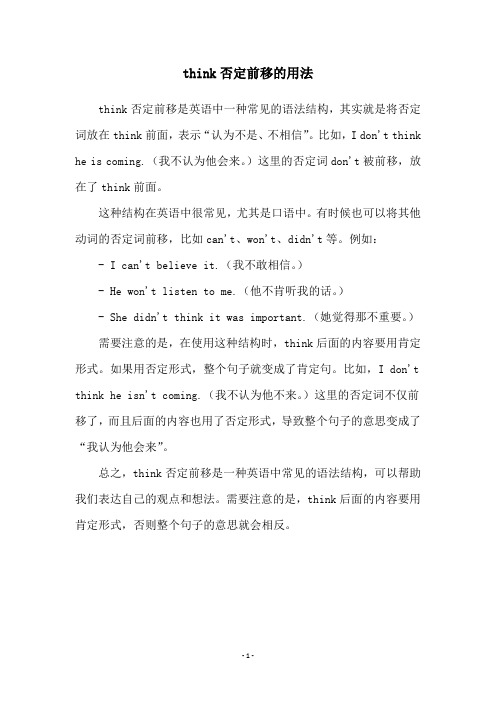
think否定前移的用法
think否定前移是英语中一种常见的语法结构,其实就是将否定词放在think前面,表示“认为不是、不相信”。
比如,I don't think he is coming.(我不认为他会来。
)这里的否定词don't被前移,放在了think前面。
这种结构在英语中很常见,尤其是口语中。
有时候也可以将其他动词的否定词前移,比如can't、won't、didn't等。
例如:
- I can't believe it.(我不敢相信。
)
- He won't listen to me.(他不肯听我的话。
)
- She didn't think it was important.(她觉得那不重要。
)需要注意的是,在使用这种结构时,think后面的内容要用肯定形式。
如果用否定形式,整个句子就变成了肯定句。
比如,I don't think he isn't coming.(我不认为他不来。
)这里的否定词不仅前移了,而且后面的内容也用了否定形式,导致整个句子的意思变成了“我认为他会来”。
总之,think否定前移是一种英语中常见的语法结构,可以帮助我们表达自己的观点和想法。
需要注意的是,think后面的内容要用肯定形式,否则整个句子的意思就会相反。
- 1 -。
关于think的用法

关于think的用法一级标题:探索“think”一词的用法二级标题1:think的基本意义及用法在英语中,“think” 是一个常见且多功能的动词,具有丰富的含义和用法。
它可以表示思考、认为、相信、猜测等不同的概念,并结合其他词汇构成各种短语和表达方式。
二级标题2:表示思考和认为1. 表示思考:Think作为一个动词,最基本的意义是指进行思考。
例如:- I need some time to think about the problem.(我需要一些时间来思考这个问题。
)- She sat there, just thinking about what he had said.(她坐在那里,只是在想他说的话。
)2. 表示认为:Think也可以表示某人对某事物抱有某种观点或看法,即特指“认为”。
例如:- I think it's a great idea.(我觉得这是个好主意。
)- He thinks that studying abroad can broaden one's horizons.(他认为出国留学能够开阔人的眼界。
)二级标题3:表示相信和推测1. 表示相信:Think还可用于表示对某件事情持有信念或相信。
例如:- I think she will come to the party tonight.(我相信她今晚会来参加派对。
)- They think that honesty is the best policy.(他们认为诚实是最好的策略。
)2. 表示推测:Think还可用于表示假设、猜测或推测。
例如:- I think it might rain tomorrow.(我猜明天可能会下雨。
)- He thinks they are hiding something from him.(他觉得他们对他隐瞒了什么。
)二级标题4:think的常见短语和搭配1. Think about:意为“考虑”,表示思索某个问题或情况。
think,think_of,think_about,think_over的区别和用法
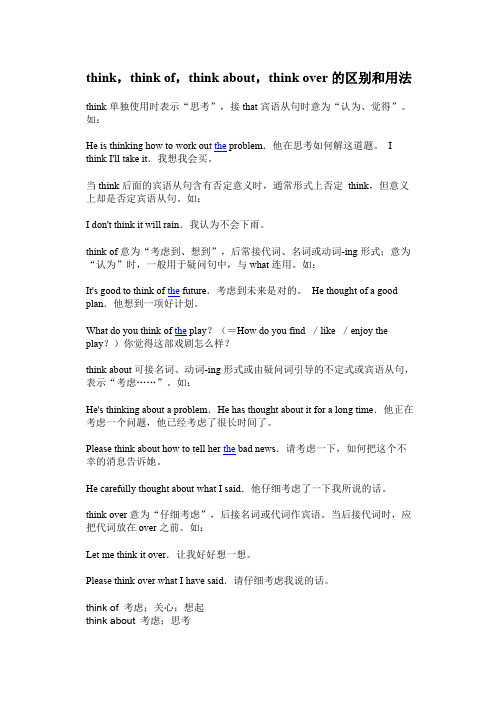
think,think of,think about,think over的区别和用法think单独使用时表示“思考”,接that宾语从句时意为“认为、觉得”。
如:He is thinking how to work out the problem.他在思考如何解这道题。
I think I'll take it.我想我会买。
当think后面的宾语从句含有否定意义时,通常形式上否定think,但意义上却是否定宾语从句。
如:I don't think it will rain.我认为不会下雨。
think of意为“考虑到、想到”,后常接代词、名词或动词-ing形式;意为“认为”时,一般用于疑问句中,与what连用。
如:It's good to think of the future.考虑到未来是对的。
He thought of a good plan.他想到一项好计划。
What do you think of the play?(=How do you find /like /enjoy the play?)你觉得这部戏剧怎么样?think about可接名词、动词-ing形式或由疑问词引导的不定式或宾语从句,表示“考虑……”。
如:He's thinking about a problem.He has thought about it for a long time.他正在考虑一个问题,他已经考虑了很长时间了。
Please think about how to tell her the bad news.请考虑一下,如何把这个不幸的消息告诉她。
He carefully thought about what I said.他仔细考虑了一下我所说的话。
think over意为“仔细考虑”,后接名词或代词作宾语。
当后接代词时,应把代词放在over之前。
如:Let me think it over.让我好好想一想。
think用法
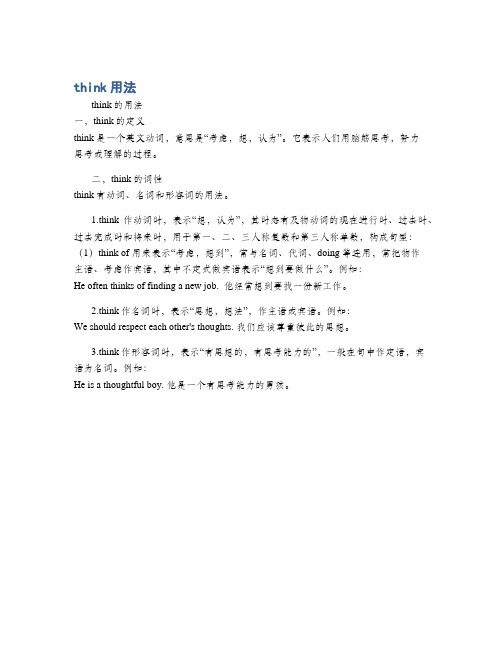
think用法
think的用法
一,think的定义
think是一个英文动词,意思是“考虑,想,认为”。
它表示人们用脑筋思考,努力
思考或理解的过程。
二,think的词性
think有动词、名词和形容词的用法。
1.think作动词时,表示“想,认为”,其时态有及物动词的现在进行时、过去时、过去完成时和将来时,用于第一、二、三人称复数和第三人称单数,构成句型:(1)think of 用来表示“考虑,想到”,常与名词、代词、doing等连用,常把物作
主语、考虑作宾语,其中不定式做宾语表示“想到要做什么”。
例如:
He often thinks of finding a new job. 他经常想到要找一份新工作。
2.think作名词时,表示“思想,想法”,作主语或宾语。
例如:
We should respect each other's thoughts. 我们应该尊重彼此的思想。
3.think作形容词时,表示“有思想的,有思考能力的”,一般在句中作定语,宾语为名词。
例如:
He is a thoughtful boy. 他是一个有思考能力的男孩。
think,think_of,think_about,think_over的区别和用法

think,think of,think about,think over的区别和用法think单独使用时表示“思考”,接that宾语从句时意为“认为、觉得”。
如:He is thinking how to work out the problem.他在思考如何解这道题。
I think I'll take it.我想我会买。
当think后面的宾语从句含有否定意义时,通常形式上否定think,但意义上却是否定宾语从句。
如:I don't think it will rain.我认为不会下雨。
think of意为“考虑到、想到”,后常接代词、名词或动词-ing形式;意为“认为”时,一般用于疑问句中,与what连用。
如:It's good to think of the future.考虑到未来是对的。
He thought of a good plan.他想到一项好计划。
What do you think of the play?(=How do you find /like /enjoy the play?)你觉得这部戏剧怎么样?think about可接名词、动词-ing形式或由疑问词引导的不定式或宾语从句,表示“考虑……”。
如:He's thinking about a problem.He has thought about it for a long time.他正在考虑一个问题,他已经考虑了很长时间了。
Please think about how to tell her the bad news.请考虑一下,如何把这个不幸的消息告诉她。
He carefully thought about what I said.他仔细考虑了一下我所说的话。
think over意为“仔细考虑”,后接名词或代词作宾语。
当后接代词时,应把代词放在over之前。
如:Let me think it over.让我好好想一想。
think及物不及物的用法

think及物不及物的用法
think是一个英语动词,既可以作为及物动词,也可以作为不及物动词。
以下是它的不同用法:
作为及物动词,think后通常需要加上宾语,如名词、代词或从句。
例如:
1.I think he is right.(我认为他是对的。
)
2.They think me capable.(他们认为我有能力。
)
3.We think him to be a good teacher.(我们认为他是一个好老师。
)
作为不及物动词,think后面不需要加宾语,但可以加上一些副词或介词短语来修饰。
例如:
1.I think hard about the problem.(我认真思考这个问题。
)
2.She thinks well of him.(她对他的评价很高。
)
3.They think better of me than before.(他们对我的评价比以前更好了。
)
此外,think还有一些其他的用法,例如进行时、完成时、被动语态等。
例如:
1.I am thinking about what to do next.(我正在考虑下一步做什么。
)
2.They have thought of a new plan.(他们已经想出了一个新计划。
)
3.The book is thought highly of by many readers.(这本书受到许多读者
的高度评价。
)。
think-think-of-think-about-think-over的区别和用法.

think,think of,think about,think over的区别和用法think单独使用时表示“思考”,接that宾语从句时意为“认为、觉得”。
如:He is thinking how to work out the problem.他在思考如何解这道题。
I think I'll take it.我想我会买。
当think后面的宾语从句含有否定意义时,通常形式上否定think,但意义上却是否定宾语从句。
如:I don't think it will rain.我认为不会下雨。
think of意为“考虑到、想到”,后常接代词、名词或动词-ing形式;意为“认为”时,一般用于疑问句中,与what连用。
如:It's good to think of the future.考虑到未来是对的。
He thought of a good plan.他想到一项好计划。
What do you think of the play?(=How do you find /like /enjoy the play?)你觉得这部戏剧怎么样?think about可接名词、动词-ing形式或由疑问词引导的不定式或宾语从句,表示“考虑……”。
如:He's thinking about a problem.He has thought about it for a long time.他正在考虑一个问题,他已经考虑了很长时间了。
Please think about how to tell her the bad news.请考虑一下,如何把这个不幸的消息告诉她。
He carefully thought about what I said.他仔细考虑了一下我所说的话。
think over意为“仔细考虑”,后接名词或代词作宾语。
当后接代词时,应把代词放在over之前。
如:Let me think it over.让我好好想一想。
think的用法
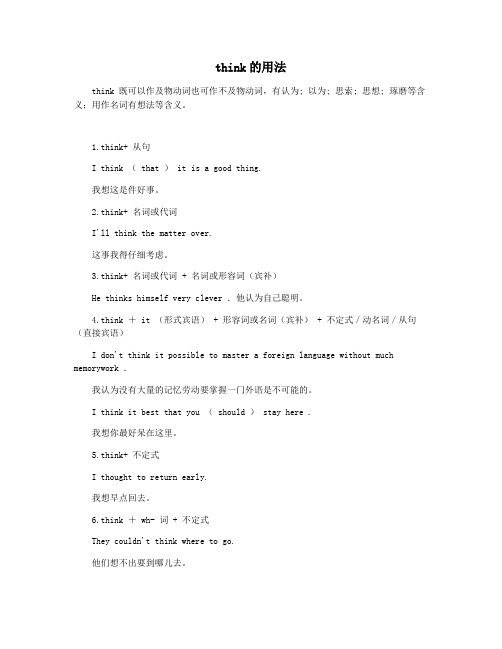
think的用法think 既可以作及物动词也可作不及物动词,有认为; 以为; 思索; 思想; 琢磨等含义;用作名词有想法等含义。
1.think+ 从句I think ( that ) it is a good thing.我想这是件好事。
2.think+ 名词或代词I'll think the matter over.这事我得仔细考虑。
3.think+ 名词或代词 + 名词或形容词(宾补)He thinks himself very clever .他认为自己聪明。
4.think + it (形式宾语) + 形容词或名词(宾补) + 不定式/动名词/从句(直接宾语)I don't think it possible to master a foreign language without much memorywork .我认为没有大量的记忆劳动要掌握一门外语是不可能的。
I think it best that you ( should ) stay here .我想你最好呆在这里。
5.think+ 不定式I thought to return early.我想早点回去。
6.think + wh- 词 + 不定式They couldn't think where to go.他们想不出要到哪儿去。
7.think+ 名词或代词 +to be 短语(宾补) People think him to be a good teacher .人们认为他是好老师。
8.can't / couldn't + think 想象,设想 You can't think how glad I am.你想象不出我是我么高兴。
感谢您的阅读,祝您生活愉快。
think的用法和短语

think的用法和短语Think是一个非常常见的英文单词,它的意思是思考,表达思考的动作和过程。
它不仅仅是一个单词,在一定的语境下,它还可以变化为多种单词的形式,比如think of,thinking,thought等,而它们之间的关系也要清楚,才能更好的理解这个单词的使用。
Think的基本用法Think的基本用法是指表达“思考,考虑,想,认为”的动作和过程。
它可以用作动词或者谓语:例如:I think the situation is getting worse.我认为情况正在变得越来越糟。
Think ofThink of这个短语表示“想起,想到,记起”的意思:例如:I can help thinking of my parents when I am alone.当我一个人的时候,我总是想起我的父母。
Think aboutThink about这个短语表示“考虑,思考,想”的意思:例如:We need to think about the long-term effects of our actions.我们需要考虑长期的影响。
Think of somethingThink of something表示“想出某事”的意思,即用来指想出某种办法、解决问题等:例如:We need to think of something to stop the pollution.我们需要想出办法来阻止污染。
Think aheadThink ahead表示“预计未来,展望未来”:例如:We need to think ahead to prepare for the long-term effects of climate change.我们需要展望未来,为气候变化的长期影响做准备。
Think twiceThink twice表示“仔细考虑,三思而后行”的意思:例如:Before you say yes, think twice.在你说是之前,要仔细考虑一下。
think的用法和短语例句

think的用法和短语例句think有认为;想;记起;考虑等意思,那么你知道think的用法吗?下面跟着店铺一起来学习think的用法和短语例句,希望对大家的学习有所帮助!think的用法think的用法1:think的基本意思是“想,思索”,指使一件事情在头脑中不断地浮现或使这件事保持这种浮现的状态,可以表示“想”的动作,也可以表示“想”的状态。
还可指“以为,认为”,指某事在头脑中形成一个固定的概念,即“想”的结果。
think还有“想象”“想起”“打算”等意思。
作“料想,想象”解时,通常用于否定句,不用于被动结构,且常与can〔could〕连用。
think在口语中,尤其是美式英语中还可表示“朝…方面想”或“专想(某件事)”。
think的用法2:think可用作及物动词,也可用作不及物动词。
用作及物动词时,后接同源名词、代词、动词不定式、带有疑问词的动词不定式或that/wh-从句作宾语。
接动词不定式作宾语时,多用于否定句或疑问句中。
think的用法3:think作“认为”解时,可接复合宾语,其宾语由名词、动名词、动词不定式或that从句充当。
充当宾语的动名词、动词不定式或that从句常置于宾语补足语之后,而以it作形式宾语置于宾语补足语之前(it现在趋向省去); 其宾语补足语可由“(to be+) n./adj./v -ed”充当,有时也可以 v -ing充当。
think的用法4:think是表示思维活动的动词,常用于转移否定结构,即形式上是否定主句的谓语动词think,但意思却是否定从句的谓语动词。
think的用法5:T o think that ...意为“没想到”“竟然”,Who would have thought ...表示“谁会想到”, wouldn't〔couldn't, shouldn't〕 think of表示“绝不能考虑〔想象〕”,这三个词组都表示因事先未料到某事而感到惊讶。
think,thinkof,thinkabout,thinkover的区别和用法
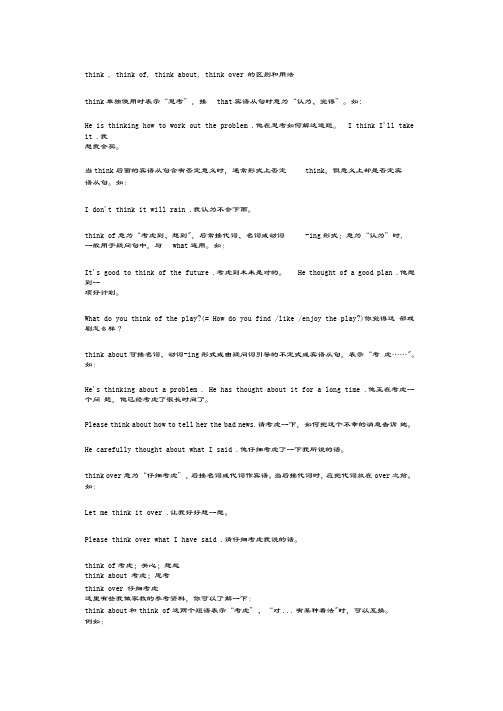
think , think of, think about, think over 的区别和用法think单独使用时表示“思考”,接that宾语从句时意为“认为、觉得”。
如:He is thinking how to work out the problem .他在思考如何解这道题。
I think I'll take it .我想我会买。
当think后面的宾语从句含有否定意义时,通常形式上否定think,但意义上却是否定宾语从句。
如:I don't think it will rain .我认为不会下雨。
think of意为“考虑到、想到",后常接代词、名词或动词-ing形式;意为“认为”时,一般用于疑问句中,与what连用。
如:It's good to think of the future .考虑到未来是对的。
He thought of a good plan .他想到一项好计划。
What do you think of the play?(= How do you find /like /enjoy the play?)你觉得这部戏剧怎么样?think about可接名词、动词-ing形式或由疑问词引导的不定式或宾语从句,表示“考虑……"。
如:He's thinking about a problem . He has thought about it for a long time .他正在考虑一个问题,他已经考虑了很长时间了。
Please think about how to tell her the bad news.请考虑一下,如何把这个不幸的消息告诉她。
He carefully thought about what I said .他仔细考虑了一下我所说的话。
think over意为“仔细考虑”,后接名词或代词作宾语。
当后接代词时,应把代词放在over之前。
think的用法及注意事项
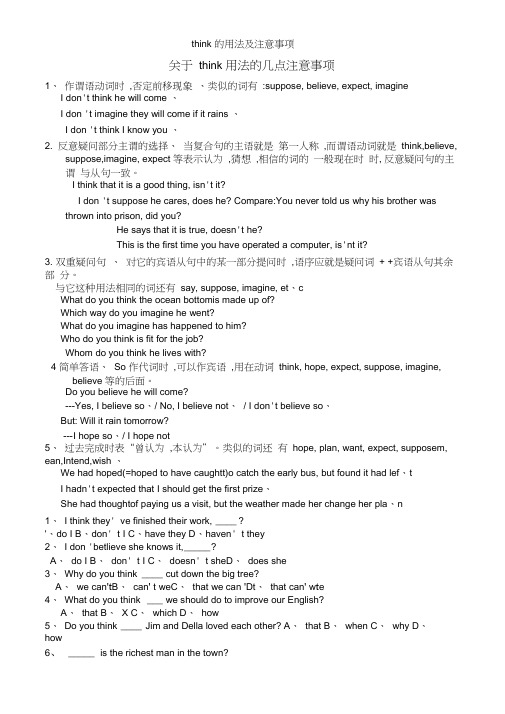
think 的用法及注意事项关于think 用法的几点注意事项1、作谓语动词时,否定前移现象、类似的词有:suppose, believe, expect, imagineI don't think he will come 、I don 't imagine they will come if it rains 、I don 't think I know you 、2. 反意疑问部分主谓的选择、当复合句的主语就是第一人称,而谓语动词就是think,believe,suppose,imagine, expect 等表示认为,猜想,相信的词的一般现在时时, 反意疑问句的主谓与从句一致。
I think that it is a good thing, isn't it?I don 't suppose he cares, does he? Compare:You never told us why his brother wasthrown into prison, did you?He says that it is true, doesn't he?This is the first time you have operated a computer, is'nt it?3. 双重疑问句、对它的宾语从句中的某一部分提问时,语序应就是疑问词+ +宾语从句其余部分。
与它这种用法相同的词还有say, suppose, imagine, et、cWhat do you think the ocean bottomis made up of?Which way do you imagine he went?What do you imagine has happened to him?Who do you think is fit for the job?Whom do you think he lives with?4 简单答语、So 作代词时,可以作宾语,用在动词think, hope, expect, suppose, imagine,believe 等的后面。
关于think用法的几点注意事项

关于think用法的几点注意事项Think是一个非常常用的动词,具有多种用法和意义。
下面是关于think用法的几点注意事项:1. Think作为“思考、认为”的意思时,可以带有宾语从句或作为不及物动词使用:- I think she is a nice person.(宾语从句)2. Think可以用作“考虑、想要”的意思,后面常接动词不定式或介词短语:- I'm thinking about going to the party tonight.(动词不定式)- I'm thinking of taking a vacation next month.(介词短语)3. Think还可以表示“记起、回想起”的意思,常与介词of或back连用:- I can't think of his name right now.(回想不起)- I often think back to the days when we were together.(回想过去的时光)4. Think作为“计划、打算”的意思时,常与介词about或of连用,或与that引导的宾语从句连用:- She is thinking about starting her own business.(介词短语)- They are thinking of moving to a different city.(介词短语)- I think that I will go to the meeting tomorrow.(宾语从句)5. Think可以表示“猜测、推测”的意思,后接宾语从句或直接接名词、代词:- I think he will arrive soon.(宾语从句)- I think it will rain tomorrow.(直接接名词)- What do you think?(直接接代词)6. 当think后面接动词-ing形式时,表示“认为、觉得”:- I think learning a new language is beneficial.(认为学习新语言是有益的)7. Think还可以表示“评估、判断”的意思,常与介词of连用:- What do you think of the new restaurant?(评价新餐厅)- I think highly of him as a musician.(评估他作为音乐家的能力)8. Think用作名词时,表示“思考、想法”的意思:- What's your think on this matter?(你对这件事有何看法?)9.还有一些常用的搭配用法如下:- think twice:三思而后行- think outside the box:跳出思维定势- think on your feet:当机立断- think big:胸怀大志- think tank:智囊团总之,think作为一个常用的动词,有着丰富的用法和意义。
think的第三人称单数和例句

think的第三人称单数和例句think的第三人称单数: thinks think的用法: think的用法1:think的基本意思是“想,思索”,指使一件事情在头脑中不断地浮现或使这件事保持这种浮现的状态,可以表示“想”的动作,也可以表示“想”的状态。
还可指“以为,认为”,指某事在头脑中形成一个固定的概念,即“想”的结果。
think还有“想象”“想起”“打算”等意思。
作“料想,想象”解时,通常用于否定句,不用于被动结构,且常与can〔could〕连用。
think在口语中,尤其是美式英语中还可表示“朝…方面想”或“专想(某件事)”。
think的用法2:think可用作及物动词,也可用作不及物动词。
用作及物动词时,后接同源名词、代词、动词不定式、带有疑问词的动词不定式或that/wh-从句作宾语。
接动词不定式作宾语时,多用于否定句或疑问句中。
think的用法3:think作“认为”解时,可接复合宾语,其宾语由名词、动名词、动词不定式或that从句充当。
充当宾语的动名词、动词不定式或that从句常置于宾语补足语之后,而以it作形式宾语置于宾语补足语之前(it现在趋向省去); 其宾语补足语可由“(to be+) n./adj./v -ed”充当,有时也可以 v -ing充当。
think的用法4:think是表示思维活动的动词,常用于转移否定结构,即形式上是否定主句的谓语动词think,但意思却是否定从句的谓语动词。
think第三人称单数例句: 1. not everyone thinks that the government is being particularly generous. 并非所有人都认为政府特别慷慨。
2. glover thinks that smith did him down, perhaps out of envy. 格洛弗认为史密斯说他坏话,也许是出于嫉妒。
3. he thinks we are living in a fully integrated, supportive society. 他认为我们生活在一个完全和谐、相互扶持的社会里。
think后面加从句的用法
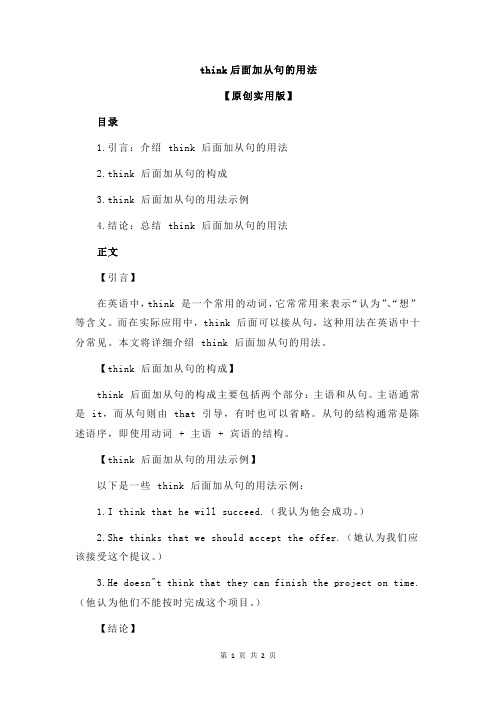
think后面加从句的用法
【原创实用版】
目录
1.引言:介绍 think 后面加从句的用法
2.think 后面加从句的构成
3.think 后面加从句的用法示例
4.结论:总结 think 后面加从句的用法
正文
【引言】
在英语中,think 是一个常用的动词,它常常用来表示“认为”、“想”等含义。
而在实际应用中,think 后面可以接从句,这种用法在英语中十分常见。
本文将详细介绍 think 后面加从句的用法。
【think 后面加从句的构成】
think 后面加从句的构成主要包括两个部分:主语和从句。
主语通常是 it,而从句则由 that 引导,有时也可以省略。
从句的结构通常是陈述语序,即使用动词 + 主语 + 宾语的结构。
【think 后面加从句的用法示例】
以下是一些 think 后面加从句的用法示例:
1.I think that he will succeed.(我认为他会成功。
)
2.She thinks that we should accept the offer.(她认为我们应该接受这个提议。
)
3.He doesn"t think that they can finish the project on time.(他认为他们不能按时完成这个项目。
)
【结论】
总的来说,think 后面加从句的用法是英语中一种非常常见的表达方式,它可以用来表达各种不同的想法和观点。
- 1、下载文档前请自行甄别文档内容的完整性,平台不提供额外的编辑、内容补充、找答案等附加服务。
- 2、"仅部分预览"的文档,不可在线预览部分如存在完整性等问题,可反馈申请退款(可完整预览的文档不适用该条件!)。
- 3、如文档侵犯您的权益,请联系客服反馈,我们会尽快为您处理(人工客服工作时间:9:00-18:30)。
关于think用法的几点注意事项
1. 作谓语动词时,否定前移现象.类似的词有:suppose, believe, expect, imagine
I don’t think he will come.
I don’t imagine they will come if it rains.
I don’t think I know you.
2.反意疑问部分主谓的选择. 当复合句的主语是第一人称,而谓语动词是think,believe, suppose,imagine, expect等表示认为,猜想,相信的词的一般现在时时,反意疑问句的主谓与从句一致。
I think that it is a good thing, isn’t it?
I don’t suppose he cares, does he?
Compare:You never told us why his brother was thrown into prison, did you?
He says that it is true, doesn’t he?
This is the first time you have operated a computer, isn’t it?
3.双重疑问句. 对它的宾语从句中的某一部分提问时,语序应是疑问词+ +宾语从句其余部分。
和它这种用法相同的词还有say, suppose, imagine, etc.
What do you think the ocean bottom is made up of?
Which way do you imagine he went?
What do you imagine has happened to him?
Who do you think is fit for the job?
Whom do you think he lives with?
4简单答语. So 作代词时,可以作宾语,用在动词think, hope, expect, suppose, imagine, believe 等的后面。
Do you believe he will come?
---Yes, I believe so./ No, I believe not./ I don’t believe so.
But: Will it rain tomorrow?
----I hope so./ I hope not
5. 过去完成时表“曾认为,本认为”。
类似的词还
有hope, plan, want, expect, suppose, mean,Intend,wish.
We had hoped(=hoped to have caught) to catch the early bus, but found it had left.
I hadn’t expected that I should get the first prize.
She had thought of paying us a visit, but the weather made her change her plan.
1. I think they’ve finished their work,_____?
`. do I B. don’t I C. have they D. haven’t they
2. I don’t believe she knows it,______?
A. do I
B. don’t I
C. doesn’t she
D. does she
3. Why do you think ____ cut down the big tree?
A. we can’t
B. can’t we
C. that we can’t
D. that can’t we
4. What do you think ____ we should do to improve our English?
A. that
B. X
C. which
D. how
5. Do you think _____ Jim and Della loved each other? A. that B. when C. why D. how
6. ______ is the richest man in the town?
A. Whom do you think
B. Who do you think
C. Do you think who
D. Do you think whom
7. She thought Tom had done it, ____?
A. didn’t she
B. did she
C. hadn’t she
D. had he
8. ---Will it rain tomorrow? --- ________.
A. I don’t think it
B. I don’t hope so
C. I hope
D. I don’t think so
9. What do you think ____ an apple ____ to the ground
A. cause; to fall
B. to cause; falling
C. causes; to fall
10. Where do you think ____ he ____ the computer?
A.X; bought
B. has; bought
C. did; buy
D. had; bought
11. Which record of his do they say_____ best in this shop?
A. sells
B. is sold
C. sell
D. are sold
12.----He promised to come on time.
----What do you imagine _____ to him then?
A. has happened
B. was happening
C. happening
D. was happened.
13.---What do you think ____ him so upset?
---I have no idea because I wasn’t at home then.
A. making
B. made
C. to make
D. to have made
14. It was such a serious mistake, _____ caused by carelessness.
A. which I think was
B. which I think it was
C. I think which was
D. I think which it was
关于否定转移的补充
1.若否定不转移,则否定意义较强,因此语义不委婉。
2.当think以过去时,过去进行时或过去完成时,现在完成时或现在进行时出现时,不用转移。
I thought that you hadn’t finished the job.
I was thinking that you wouldn’t come to my help.
I had thought he wouldn’t come to my help.
I’ve supposed that I won’t trouble you again.
I’ve been thinking that the sky won’t fall down. 我一直相信天不会塌下来。
3.当think前有副词修饰语时,不转移。
I often/always think that you are not fit for that job.
I really think you needn’t worry about his safety。
4.当think前有助动词do 表强调时,不转移。
I do think that you shouldn’t do that.
I do think it is wise of him to do so。
5. 当think用在疑问句中时。
Why do you think I can’t change your note.
Do you think my mother wouldn’t permit this?
6. 当think与情态动词连用时。
He must think I am not for the job。
7.当宾语从句有no,never,hardly,等否定副词时。
I believe John never tells a lie.。
